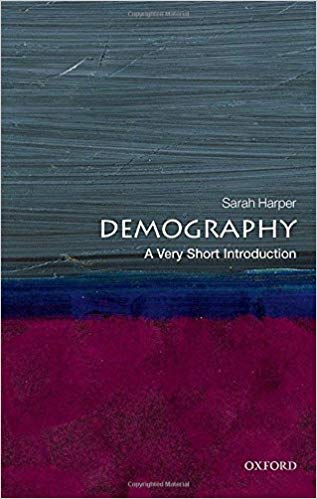You have /5 articles left.
Sign up for a free account or log in.
 Demography: A Very Short Introduction by Sarah Harper
Demography: A Very Short Introduction by Sarah Harper
Published in May of 2018
How many of you are doing higher ed jobs that are not directly related to the discipline that you trained?
My PhD is in sociology, with a concentration in demography. I work at a Teaching and Learning Center as a director of digital learning initiatives. Go figure. How someone trained in sociology and demography ended up building an academic career in online and digital learning is a question that I often ask myself.
If you are an alternative academic (alt-ac), then I can say with close to 100 percent certainty that your primary academic role is different from your academic training. How did you go from what you spent too many years getting a terminal degree in to then not spending your time teaching and writing within your discipline?
The alt-ac pivot from what we trained in, to what we do now, was much on my mind as I read Demography: A Very Short Introduction.
First, even if you are not a trained (but lapsed) demographer, or an alt-ac, I recommend this book. While I no longer do demography, I am constantly finding that the theories, frameworks, tools, and methods of demography are incredibly useful in my work.
Demography teaches you to understand social change as, at least in part, a function of population trends. We will not understand the future of higher ed unless we know which questions we should ask about fertility, aging, and migration. This concise introduction to population studies provides an accessible and actionable introduction to the most important findings, theories, and techniques of the discipline.
The required investment to read Demography: A Very Short Introduction is made more manageable by the fact that the book is available in Amazon’s integrated e-book (Kindle) and audiobook (Audible) Whispersync format. At 4 hours and 2 minutes and 152 pages, and with the ability to switch between eyes and ears, the book goes quickly.
I’m totally in love with concise, tight, and well-written books. Some books deserve lots of pages. The longest book that I read in 2018 was Jill Lepore’s incredible These Truths: A History of the United States, which came in at 960 pages and 29 hours. Not a page in These Truths is wasted.
Most books that I read, however, would be 90 percent as good if they were half as long. I’m not sure what forces are at work to push authors to pad their nonfiction books. Maybe short books don’t sell as well?
While the material in Demography: A Very Short Introduction was, of course, familiar - I was surprised at how much I learned from reading the book. One would think that getting a PhD in a subject would provide an excuse from reading a concise intro on the discipline. Apparently, this is not true. A PhD is such a narrow and deep exercise that it is refreshing to step back and get the larger picture.
Reading Demography: A Very Short Introduction also made me very much miss teaching and writing in the field. I only had a brief time in which I taught demography and wrote for other population scientists. Pretty quickly the demands of being a trailing spouse and my interests in online and digital education pushed me off the traditional demographer/professor track. Going back to reading about the basics of demography felt bittersweet.
The book also made me wonder if we need a Very Short Introduction to digital learning? Or maybe a concise guide to online education?
As an alt-ac, I could never write a concise overview of sociology or demography. But maybe I could co-write a Very Short Introduction to Alternative Academia?
Can you recommend a short introduction to your academic discipline?
What are your favorite concise nonfiction titles?
What would your Very Short Introduction to your alt-ac world be about?
What are you reading?








